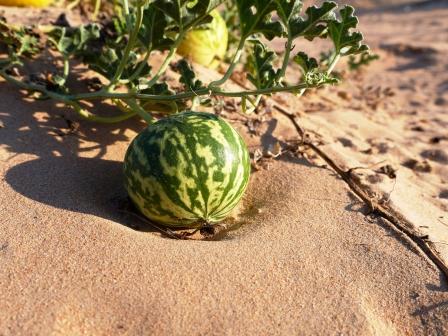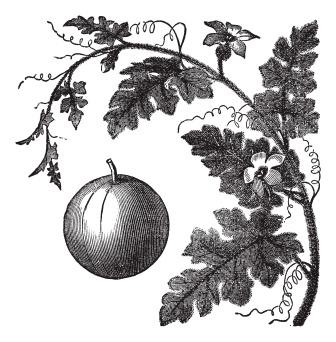Colocynth: Citrullus colocynthis Uses, Dosage, Side Effects

Colocynth is an important Ayurveda herb. It is also known as bitter apple. Its botanical name is Citrullus colocynthis and it belongs to the Cucurbitacae family (Kosataki kula).
Table of Contents
Vernacular names, Sanskrit synonyms
Hindi name: Indrayan, Indrayan ki jad (root)
Telugu name: Chedu Puccha, Cinna Papara, Kuturu budama
Malayalam and Tamil name: Pikkumutti.
Kannada name: Tamate Kayi, Tamte Kai
Bengali name: Rakhale Shasa
Punjabi name: kaudatumma
Telugu name: paparabudam
English name: Colocynth, bitter apple, bitter cucumber, desert gourd, vine of Sodom.
Sanskrit Synonyms:
Gavakshi – fruit is spherical in shape, similar to eye of cow
Chitra – fruit contains lines
Pita pushpa – Flowers are yellow in color
Vishaghni – Alleviate poison
Varuni – It has purgative action
Indravaruni – Classical categorization
Charaka Samhita:
Moolini Dravya – Group of herbs, where root is the part used.
Virechana Dravya – group of herbs used for the purpose of purgation Panchakarma therapy.
Sushruta Samhita: Shyamadi Gana, Adhobhagahara
Vagbhata: Shyamadi Gana
Bh. Pr – Guduchyadi varga
Varieties
Dha. Ni – 2 types
1. Indravaruni – Citrullus colocynthis
2. Visala – Tricosanthes palmata
Medicinal qualities, Effect on Doshas
Rasa (taste): Tikta (bitter)
Guna (qualities): Laghu (light to digest), Rooksha (dry), Teekshna (piercing, enters deep tissues)
Vipaka (taste conversion after digestion): Katu (pungent)
Veerya (potency): Ushna (hot)
Effect on Tridosha: Balances Kapha and Pitta.

Colocynth uses
Colocynth is very hot in nature and is a potent purgative.
It was used to initiate abortion.
In therapeutic doses, it is used in the treatment of
Kamala – jaundice
Pleeha – splenomegaly
Udara – ascites
Shwasa – Asthma, COPD, wheezing, breathing difficulty
Kasa – cough, cold
Kushta – skin diseases
Gulma – Abdominal tumor, bloating
Granthi – boils, nodules
Vrana – wounds
Prameha – diabetes, urinary tract disorders
Moodagarbha – malformed fetus
Part used, Dosage
Part used: Fruit, root, Leaf
Dose: Fruit powder – 125 – 500 mg
Root Powder – 1 – 2 grams per day.
Side effects
In people with sensitive stomachs, it may produce severe purgation.
It is contraindicated during pregnancy, lactation and in children.
It should only be used under medical supervision.
Take this herb only up till the prescribed time period in the prescribed dosage.
Interaction with medicines, supplements
Can this be used while taking Homeopathic medicine?
Yes. This product does not react with homeopathic medicine.
Can this medicine be continued while taking supplements like multivitamin tablets, Omega 3 fatty acids etc?
Yes. Generally, this product goes well with most dietary supplements. However, if you are taking more than one product per day, please consult your doctor for an opinion.
With western
medicines
Seek your
doctor’s advice if you are taking this product along with other western
(allopathic / modern) medicines. Some Ayurvedic herbs can interact with modern
medicine.
If both Ayurvedic and allopathic medicines are advised together, then it is
best to take Allopathic medicine first, wait for 30 minutes and then take the
Ayurvedic medicine.
Ayurvedic medicines
Ayurveda medicine with Colocynth as ingredient:
Maha Manjishtadi kashayam – Used as blood purifier in skin diseases.
Abhayarishta – used in hemorrhoids, constipation etc.
Maha Vishagarbha Taila – used in sciatica and joint disorders with stiffness as a symptom.
Mrita Sanjeevani Sura – An alcoholic Ayurveda preparation.
Morphology
Perennial twinning herb or climber, usually spreads on ground
Stem – Slender with hairy tendrils
Root – Deep, branched, Cylindrical, and yellow coloured
Flowers – Pale yellow, axillary and solitary
Fruits – Globose, glabrous, pulp is very bitter, white or brown coloured seeds
Adulterants
Cucumis callosus
Cucumis pseudocolocynthis
Cucumis hardwickii
Cucumis prophetarum
Trichosanthes palmata
Systemic action
External – Root paste and fruit juice are indicated in inflammatory wounds, boils etc. . External application of its seed oil promotes hair growth and possesses Anti poisonous action against Snake bite. .
Digestive System – Outer skin of fruit induces vomiting. Fruit rind and root is indicated in Ascites, Jaundice, Amavata (Rheumatic joint disease, Helminthiasis etc. Helps for the secretion of digestive juices. Its action is mainly in the liver and gallbladder. It can cause abdominal cramp in some patients.
Circulatory System – Act as a blood purifier. In edematous conditions fruit juice can be administered along with sugar and honey.
Respiratory System – Eliminates vitiated kapha dosha. Outer skin of fruit is indicated in cough, and other respiratory disorders.
Reproductive system – Root can cause strong uterine contraction. Indicated in conditions like Amenorrhea, prolonged labor etc.
Excretory system – Root has Anti diabetic action.
Tapakrama – Jvaraghna
Satmikarana – Act as Aphrodisiac, rejuvenative, Anti poisonous, Promote body strength, Its leaf bud decoction is indicated in snake bite poisoning, that induce vomiting and purgation, which helps to remove toxins from the body. Its paste can be used to apply externally over skin. Also indicated in Aconitum and opium poisonings.
Reproductive System – Indicated in dysmenorrhea and in conditions like delayed labor etc.











8 comments
mankindthought
Are INDRAJAVA and ENDRAYAN or INDRAVARUNI same? Kindly guide.
Dr J V Hebbar MD(Ayu)
Indrayava is – Kutaja herb seed (Holarrhena antidysenterica), used in IBS, diarrhoea, for weight loss etc. – Read about it here – https://www.easyayurveda.com/2013/10/17/kutaja-benefits-usage-dose-side-effects-ayurveda-details/
Indrayan, Endrayan are same as Indravaruni – Citrullus colocynthis.
aloke kumar das.
Are citrullus colocynthis and citrullus lanatus same? kindly guide.
Bharat Khatwani
is it toxic?
fix2fitus
Can Colocynthis cause Kidney damage?
Dr J V Hebbar MD(Ayu)
I have not heard about such a side effect.
Vimal Kamdar
Indrayan root can be use in parkinson’s???
Dr J V Hebbar MD(Ayu)
I have not come across its usage in Parkinson’s disease. If you have any information, please share.